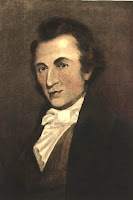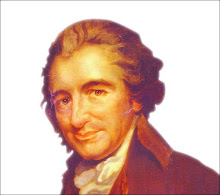"It is a contradiction in terms and ideas to call anything a revelation that comes to us at second hand, either verbally or in writing. Revelation is necessarily limited to the first communication. After this, it is only an account of something which that person says was a revelation made to him; and though he may find himself obliged to believe it, it cannot be incumbent on me to believe it in the same manner, for it was not a revelation made to me, and I have only his word for it that it was made to him."
- Thomas Paine, Age of Reason, Part 1
| This review was originally posted on a livejournal.com spot that I had forgotten all about ... until someone replied to it just today. It's a right decent little review, I believe and it made me laugh out loud, so wanted to share it with you: |
Bill Moyers on Thomas Paine, Harvey J. Kaye, and Richard Brookhiser
Finally got a chance to watch the Moyers/Paine broadcast
with Kaye and Brookhiser.
http://www.pbs.org/moyers/journal/06122
The intro by Moyers was marred with the usual "bull"
about Paine dying broke (he was quite well-off) and abandoned
(that's how people died in those days -- there WERE no
hospitals or hospice unless you were Catholic -- and
he wasn't "abandoned" any more than any elderly person
is when they die; we all die alone to some extent). Anyway,
the intro repeated the usual twaddle first grunted out
by Paine's enemies and repeated by every uncritical
commentator and author ever since. Bill, with the distinguished
historians you had there, I really believe you could have done
a better job. DISAPPOINTED!! 8^)
[I suppose I should drop Moyers a friendly email
a chide them a bit]
Brookhiser characterized the Girondin as a "bloody gang,"
repeating the old Anglophile/Francophobe hypocrisy-of-the-
ages ... as if ANY government (ours included) wasn't or
isn't "bloody." What? Burke's treasured British monarchy
wasn't bloody? Bloody hell! And what about Brookhiser's
heros? Bloody every one.
Harvey got his point in about Paine "quickly discovered the
'American spirit' and made it his own," a position that,
while open to careful criticism, is honestly defensible.
Kaye also used the correct response on the LETTER TO
GEORGE WASHINGTON, though with less force that
I would prefer. Washington was idolized when elected
and SCORNED AND HATED by half the populace when
he left office precisely for the reasons that Paine cites:
most notably the 1794 Jay Treaty. We should all memorize
the Antifederalist slogan:
Damn John Jay!
Damn everyone that won't damn John Jay!
Damn every one that won't put lights in his window
and sit up all night damning John Jay!
Washington's conduct
throughout that event was despicable. He was not at all
idolized by all and the virtual deification of Washington
largely occurred after his death. And while there is
no proof he knew Paine was in
prison, there is plenty of reason to think that he did
and no proof he didn't. Morris was Washington's
closest and most trusted friend and adviser and he
can be supposed to have been carrying out a policy
endorsed by Washington, whether Washington had
plausible deniability or not.
The discussion on AGE OF REASON was weak. In
defense of all three participants, however, it is a tricky subject. If AoR
destroyed Paine's reputation, how come it was such a
great best-seller here? It sold like hot-cakes, was almost
universally popular with university students and everybody
read it. Freethinkers of all political persuasions were not
put off. Yes, some Democratic-Republicans were offended,
but the Federalists used it to attack and discredit
Paine and Jefferson's democratic tendencies. Jefferson
was attacked just as hotly for his "infidelism" as Paine
was and, as someone on the panel pointed out, did not
write a best-selling book on the subject. As I wrote in
article in the current issue of FREE INQUIRY, "Paine
was attacked with the cudgel of religion
on account of his political views." That trend continues,
IMHO.
Originally posted http://paineite.livejournal.com/627.html?thread=883




